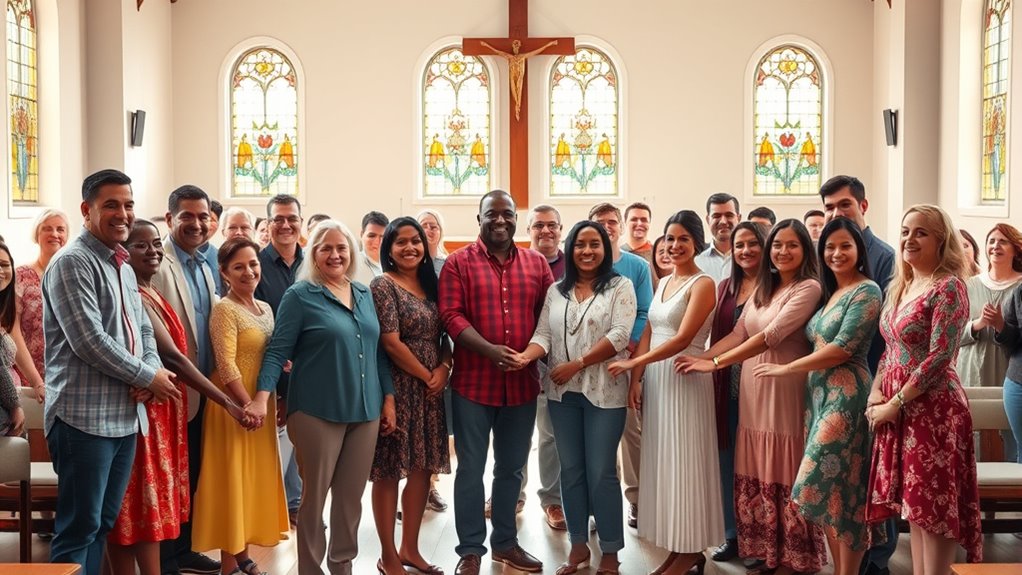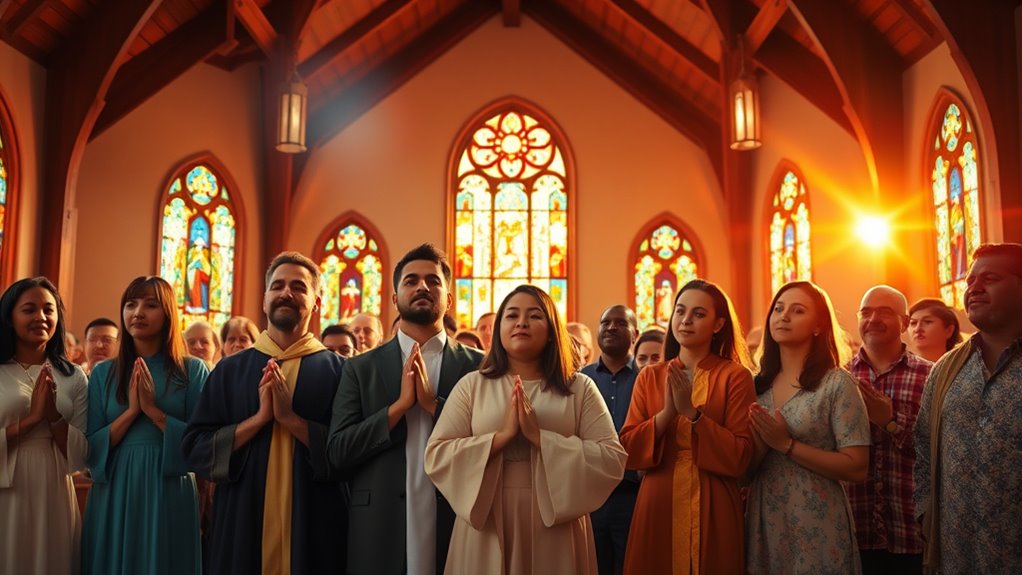To foster unity in the Body of Christ despite differences, embrace diversity as part of God’s creation and follow biblical principles that highlight love, humility, and mutual respect. Practice grace when disagreements arise, forgive quickly, and celebrate each other’s gifts and talents. Pray together, serve side by side, and focus on common goals rooted in Christ’s love. By actively working in harmony, you can strengthen your community and reflect God’s unity—there’s more to discover as you explore further.
Key Takeaways
- Embrace and appreciate diverse cultural expressions and worship styles as reflections of God’s creation, fostering inclusivity and mutual respect.
- Focus on shared core truths and biblical principles like love and unity to bridge doctrinal differences.
- Practice humble dialogue, active listening, and forgiveness to resolve disagreements and strengthen relationships.
- Recognize and celebrate each believer’s unique gifts and talents, promoting collaboration and mutual growth.
- Engage in collective prayer, fasting, and community service to deepen spiritual bonds and align efforts for God’s glory.
Embracing Diversity Within the Church

Diversity is an essential strength of the church, reflecting the richness of God’s creation. You see this in the variety of cultural expressions and worship styles present in congregations worldwide. Embracing these differences allows you to appreciate how people from diverse backgrounds connect with God uniquely. Some may prefer traditional hymns, while others resonate with contemporary worship songs. Cultural expressions influence how faith is celebrated and expressed, enriching the church community. Instead of viewing these differences as obstacles, recognize them as opportunities to learn and grow together. By honoring various worship styles and cultural expressions, you help foster an environment where everyone feels valued and included. Recognizing and respecting healthy boundaries within the congregation can facilitate more harmonious interactions. Additionally, understanding the role of color accuracy in visual representations can deepen your appreciation for how diverse communities express faith visually. Incorporating practices that enhance spiritual connection within diverse worship styles can further strengthen unity. Furthermore, developing Cultural Intelligence (CQ) can help church members better navigate and appreciate cultural differences, promoting inclusivity and mutual respect. Cultivating this cultural awareness enables the church to be more welcoming and adaptable, ultimately strengthening your shared faith and reflecting God’s universal love.
The Biblical Foundation for Unity

The Bible clearly calls believers to unity, emphasizing its importance in God’s plan. You’ll see Jesus praying for all followers to be one, showing how crucial unity is to His purpose. These scriptural truths remind you that unity isn’t optional but essential for the body of Christ. Recognizing the interconnectedness of believers can foster a sense of spiritual energy that strengthens communal bonds. As the demand for AI Ethicist Jobs increases, understanding the importance of moral and ethical alignment among diverse members becomes even more vital. Cultivating a spirit of cooperation helps believers work together despite differences, reflecting Christ’s love and unity in action. Developing a shared understanding of biblical principles can further promote harmony within the community, especially as church communities grow more diverse and inclusive.
Scriptural Calls for Unity
Have you ever noticed how the Bible repeatedly emphasizes the importance of unity among believers? Scripture calls us to live in harmony, emphasizing that unity fosters church growth and strengthens our witness. Ephesians 4:3 urges us to make every effort to keep the unity of the Spirit through peace. John 17:21 records Jesus praying for believers to be one, so the world may believe in Him. These verses show that unity isn’t optional; it’s essential for spiritual health and mission. While doctrinal differences can challenge us, Scripture reminds us to focus on core truths and maintain love. Your commitment to unity reflects God’s desire for His church to function as one body, united in purpose and mission. Additionally, understanding the financial impact of various industries, such as WWE Raw or the earnings of female singers, can foster a sense of shared purpose and collaboration within the body of Christ. Recognizing the diversity of gifts among believers encourages us to work together harmoniously, despite our differences. Studies on industry earnings reveal how diverse talents and resources can be used to benefit the broader community and advance shared goals. Moreover, the exfoliating properties of glycolic acid can be likened to the way unity helps in refining and renewing the church, removing impurities and fostering growth. Furthermore, acknowledging the vital role that different industries play can inspire collaboration and unity across various sectors, mirroring the interconnectedness of the church.
Jesus’ Prayer for Believers
Jesus’ prayer for believers provides a powerful biblical foundation for unity, showing that it’s a central part of His mission. In John 17, Jesus prays for all His followers, asking that they may be one just as He and the Father are united. This highlights the importance of church collaboration and spiritual harmony among believers. His prayer emphasizes that unity isn’t just a goal but a reflection of divine love and purpose. When you seek to foster unity, you’re aligning with Jesus’ vision for His followers. This biblical foundation reminds you that working together despite differences is essential to fulfilling God’s plan. Embracing this unity strengthens the church and advances the kingdom of God on earth, fostering spiritual harmony among diverse believers. Recognizing that divine love serves as the basis for unity encourages believers to overcome barriers and work toward common spiritual goals. Additionally, understanding the energetic alignment behind these spiritual principles can deepen your connection and commitment. Exploring candle symbolism can also serve as a metaphor for illuminating shared faith and purpose within the church community. Moreover, cultivating a sense of spiritual unity can inspire greater cooperation and mutual support among believers, reinforcing the divine purpose of the church.
Overcoming Disagreements With Grace

When disagreements arise, you can choose to embrace humble dialogue that fosters understanding rather than division. Prioritizing love and respect helps keep conversations constructive and rooted in Christ’s example. By doing so, you strengthen unity and reflect His grace even in challenging moments. Recognizing the importance of cybersecurity measures can also protect your community from external threats that may seek to divide or disrupt harmony. Additionally, cultivating a mindset that welcomes failure as a learning opportunity encourages resilience and patience in navigating conflicts. For example, understanding the horsepower of different perspectives can help clarify misunderstandings and promote patience. Practicing mindful decluttering strategies in your interactions can also lead to more intentional and peaceful communication. Paying attention to recurring angel numbers can also serve as spiritual signs guiding you toward harmony and insight during conflicts.
Embrace Humble Dialogue
Embracing humble dialogue requires you to approach disagreements with a spirit of grace and a genuine desire to understand. Instead of asserting your point, practice humble listening—truly hearing the other person’s perspective. Respectful disagreements become opportunities for growth when you focus on understanding rather than winning. Remember, humility fosters connection and trust, even amid differing opinions. To help you navigate this, consider the following:
| Situation | Response | Outcome |
|---|---|---|
| Someone challenges your view | Listen patiently, ask questions | They feel heard and valued |
| Differing opinions arise | Stay respectful, avoid defensiveness | Dialogue remains constructive |
| Conflict emerges | Seek common ground, show empathy | Strengthens relationships |
| Misunderstanding occurs | Clarify intentions, apologize if needed | Restores harmony |
| Disagreement persists | Agree to disagree kindly | Maintains unity |
Additionally, practicing humble dialogue in all interactions creates a foundation of mutual respect, which is essential for unity in the body of Christ.
Prioritize Love and Respect
Prioritizing love and respect in disagreements helps you navigate conflicts with grace and humility. When you choose to approach differences with kindness, you foster church unity and strengthen spiritual harmony. Recognizing that everyone’s perspective is valuable encourages patience and understanding, even amid disagreements. Respecting others’ viewpoints shows that you value their contribution and promotes a spirit of cooperation. Love guides your actions, reminding you to be gentle and forgiving rather than confrontational. By focusing on these principles, you help create an environment where conflicts are resolved constructively, not destructively. This mindset helps maintain the unity of the body of Christ, ensuring that disagreements become opportunities for growth and deeper connection rather than division.
The Role of Forgiveness and Patience

Forgiveness and patience are essential for maintaining unity within the Body of Christ. When conflicts arise, choosing forgiveness can lead to reconciliation and healing, strengthening your community. It’s important to remember that forgiveness isn’t always easy, but it’s crucial for moving past hurt and division. Patience allows you to endure difficult moments without giving up, giving others space to grow and change. By practicing patience, you demonstrate Christ’s love, showing that unity isn’t about uniformity but about understanding and grace. When you forgive and remain patient, you foster an environment where differences are respected, and relationships are restored. These qualities help you work together harmoniously, reflecting Christ’s example and promoting a united, resilient body of believers.
Celebrating Different Gifts and Talents

You have unique gifts and talents that strengthen the whole body of Christ. When you value diverse perspectives, everyone benefits and grows in faith. Celebrating these spiritual gifts helps create a more united and vibrant community.
Embracing Unique Abilities
Have you ever considered how each person’s unique gifts contributes to the strength of the whole body? When you recognize and embrace these abilities, you foster mutual understanding, which deepens trust and respect among members. Every talent, whether big or small, plays a crucial role in achieving a shared purpose. By celebrating each other’s abilities, you create an environment where diverse skills complement one another rather than compete. This appreciation encourages collaboration and innovation, strengthening your unity. Remember, embracing unique abilities isn’t about uniformity but about valuing different contributions. When you do this, you build a more resilient, harmonious community that works together effectively, despite individual differences. Your acknowledgment of these talents nurtures a spirit of cooperation rooted in love and respect.
Valuing Diverse Perspectives
Valuing diverse perspectives means recognizing that each person’s unique gifts and talents enrich the community in ways others might not see. When you appreciate cultural expressions and respect theological differences, you foster a deeper understanding and unity. These differences remind us that God’s body is beautifully varied and full of potential. Embracing this diversity can inspire you to:
- Celebrate the richness of different cultural expressions that bring color to your faith community.
- Understand that theological differences deepen your spiritual growth and insight.
- Recognize that each perspective contributes to a more complete picture of God’s love.
- Build trust and respect by valuing what each person uniquely offers, strengthening the unity of Christ’s body.
Celebrating Spiritual Gifts
Recognizing and appreciating the diverse spiritual gifts within your community can deepen your collective faith journey. When you celebrate different talents, you foster unity and empower others to serve effectively. Whether it’s leading a church outreach, inspiring youth ministry, or offering hospitality, each gift plays a essential role. Use this table to see how varied gifts strengthen your church:
| Gift Type | Example | Impact |
|---|---|---|
| Leadership | Organizing community events | Guides outreach efforts |
| Hospitality | Welcoming newcomers | Builds inclusive environment |
| Teaching | Bible study facilitation | Deepens faith understanding |
| Service | Assisting in youth activities | Engages younger members |
| Wisdom | Offering spiritual counsel | Strengthens collective faith |
Celebrate these talents, and watch your community thrive through unity and purpose.
Building Genuine Relationships in Christ

Building genuine relationships in Christ requires intentional effort and a sincere desire to connect with others on a spiritual level. You can foster bonds through shared experiences like church music, where unity and harmony reflect Christ’s love. Engaging in community outreach helps you see others’ needs and respond with compassion, strengthening trust. Here are four ways to deepen your relationships:
- Pray together regularly, inviting God into your connections.
- Share personal stories to build vulnerability and trust.
- Serve side by side in outreach projects, fostering teamwork.
- Celebrate spiritual milestones, encouraging mutual growth.
Practicing Humility and Mutual Respect

Practicing humility and mutual respect is essential for fostering unity within the Body of Christ. When you approach others with humility, you open the door for genuine mutual understanding, recognizing that everyone has unique perspectives and gifts. Respectful dialogue allows you to listen actively and respond thoughtfully, even when disagreements arise. By valuing others’ opinions and acknowledging your own limitations, you create an environment where unity can flourish. Remember, humility doesn’t mean weakness; it’s a strength that invites collaboration and reconciliation. Mutual respect encourages trust and helps break down barriers that divide us. As you practice these virtues, you strengthen the bonds of Christ’s body, demonstrating love and humility that lead to true unity despite differences.
The Power of Prayer for Unity

Prayer holds immense power to unify believers and strengthen the Body of Christ. When you come together in prayer circles, your collective faith creates a force that fosters understanding and harmony. Fasting rituals deepen your focus, opening your heart to God’s guidance for unity. Through sincere prayer, you can:
Unity in faith is strengthened through collective prayer and fasting, opening hearts to God’s guidance and fostering harmony.
- Experience divine peace that transcends differences
- Heal divisions by seeking forgiveness and reconciliation
- Cultivate empathy and compassion within your community
- Strengthen bonds through shared spiritual devotion
These moments of focused prayer and fasting serve as powerful tools, reminding you that unity is rooted in divine strength. When you pray earnestly for one another, you align your hearts with God’s purpose, making unity not just possible but inevitable.
Serving Together to Glorify God

Serving together is a powerful way to honor God and demonstrate the unity of the Body of Christ. When you engage in church outreach and community service, you reflect Christ’s love and purpose. Working side by side with others, despite differences, shows that your focus is on glorifying God rather than individual preferences. These acts of service unite believers around a common goal—helping those in need and spreading the Gospel. As you serve together, you build stronger bonds and deepen your faith. Your collective effort becomes a testimony to God’s grace and power working through His church. Remember, when you serve in unity, you magnify God’s glory and fulfill His calling for His people to serve one another selflessly.
Cultivating a Spirit of Cooperation

When believers work together harmoniously, their collective effort becomes more impactful and reflects Christ’s love more vividly. Cultivating a spirit of cooperation is essential for fostering church unity and spiritual harmony. To do this, you must prioritize understanding, patience, and humility.
Harmony among believers amplifies Christ’s love and strengthens church unity through understanding, patience, and humility.
Here are four ways to nurture cooperation:
- *Listen actively* to others’ perspectives, valuing their contributions.
- *Practice forgiveness* to break down barriers and rebuild trust.
- *Encourage open communication* to address conflicts early and honestly.
- *Celebrate shared goals* that unite everyone in Christ’s purpose.
Frequently Asked Questions
How Can Churches Effectively Promote Unity Across Diverse Cultural Backgrounds?
To promote unity across diverse cultural backgrounds, you should prioritize cultural understanding and foster open cross-cultural communication. Encourage church members to share their traditions and stories, creating a respectful environment. Actively listen and learn from others’ perspectives, breaking down barriers. Organize multicultural events and prayer sessions that celebrate differences. By doing so, you help build genuine connections, strengthening the church’s unity despite cultural diversity.
What Are Practical Steps to Resolve Conflicts Without Compromising Biblical Truth?
When facing conflicts, you can overcome communication barriers by actively listening and seeking understanding. Focus on conflict resolution by addressing issues calmly and biblically, ensuring you stay true to biblical truth. Don’t ignore differences; instead, use Scripture to guide your responses. Pray for wisdom and humility, and always aim for reconciliation. These practical steps help resolve conflicts effectively while maintaining faithfulness to biblical principles.
How Does Spiritual Maturity Influence Unity Within a Church Community?
Spiritual maturity is like a superhero power that transforms your ability to foster unity in your church. When you pursue spiritual growth, you develop maturity indicators like patience, humility, and love, which practically eliminate conflicts. With this growth, you see beyond differences, working together seamlessly. Your maturity becomes a beacon, inspiring others and strengthening the entire body of Christ, making unity not just an ideal, but a powerful reality.
In What Ways Can Youth and Seniors Collaborate to Strengthen Church Unity?
You can foster unity by encouraging youth and seniors to engage in intergenerational mentorship, where they share life experiences and wisdom. Organize shared faith activities that bring both groups together, promoting understanding and respect. By valuing each other’s perspectives and working as a team, you strengthen the church’s unity. This collaboration creates a welcoming environment, highlighting that everyone’s contribution is essential regardless of age.
How Can Leaders Foster an Environment of Openness and Mutual Respect?
Think of your church as a garden where trust building and communication skills are the water and sunlight. As a leader, you can foster openness by encouraging honest dialogue and active listening. Show respect for different perspectives and create safe spaces for sharing ideas. When you model transparency and empathy, you nurture an environment where everyone feels valued, strengthening bonds and cultivating unity in the body of Christ.
Conclusion
Imagine the body of Christ as a vibrant tapestry, each thread unique yet woven together in harmony. Your differences, like colors and textures, add depth and beauty to the whole. When you work with humility, patience, and prayer, you strengthen this divine fabric. Embrace your role, trust in God’s design, and remember—together, you create a masterpiece that reflects His love and glory for all to see.










